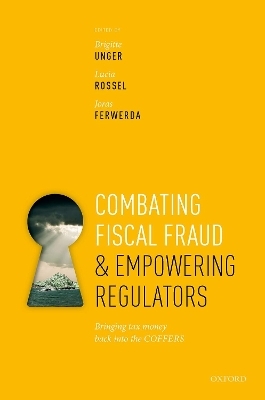
Combating Fiscal Fraud and Empowering Regulators
Oxford University Press (Verlag)
978-0-19-885472-2 (ISBN)
Combating Fiscal Fraud and Empowering Regulators analyzes the impact of new international tax regulations on the scope and scale of tax evasion, tax avoidance, and money laundering. These are analyzed through an ecosystem framework in which, similar to a natural ecosystem, new tax regulations appear as heavy shocks to the tax ecosystem, to which the 'species' such as countries, corporations, and tax experts will react by looking for new loopholes and niches of survival. By analyzing the impact of tax reforms from different perspectives--a legal, political science, accounting, and economic one--one may derive an assessment of the reforms and policy recommendations for an improved international tax system.
The ultimate goal is to combat fiscal fraud and empower regulators, in that line, this volume is intended for a broad audience that seeks to know more about the latest state of the art in the realm of taxation from a multidisciplinary perspective. The money involved amounts to billions in unpaid taxes that could be better used for stopping hunger, guaranteeing education, and safeguarding biodiversity, hence making this world a better one. Regulators can see this book as a guiding light of what has happened in the past forty years, and how the world has and will continue to change as a result of it. Combating Fiscal Fraud and Empowering Regulators is also a warning about new emerging tax loopholes, such as freeports or golden passports and visas, where residency can be bought in tax havens, even within the European Union. The main message is that inequality can and has to be reduced substantially and that this can be achieved through a well-working international tax system that eliminates secrecy, opaqueness, and tax havens.
Brigitte Unger, born in Austria in 1955, has studied economics at the Vienna University of Economics and at the Wirtschaftsuniversitaet Wien, where she also became professor. She was a Fulbright and Erwin Schroedinger visiting fellow at Harvard and Stanford University, and fellow at the Dutch Netherlands Institute for Advanced Behavioural Sciences. In 1993 she was nominated global leader for tomorrow by the World Economic Forum. Since 2002 she holds the chair of Economics of the Public Sector at the Utrecht University School of Economics. From 2012 until 2015 Brigitte Unger was also Director of the Institute of Economics and Social Sciences (WSI), in Düsseldorf. Her publications are on Corporatism, Economic Policy, Tax Competition, and Money Laundering. She did the first Money Laundering Measurement for the Netherlands in 2006, has published six books with Edward Elgar on Money Laundering and several academic articles on it. Lucia Rossel Flores is currently a PhD candidate at Utrecht School of Economics. She holds a BSc in Political Science from Universidad del Desarrollo in Chile and a MSc in Economics of Public Policy and Management from Utrecht University School of Economics. Her main interests are the interplay between law, political science and economics in regard to taxation, the behavioral aspects of tax compliance, as well as inequality and development. She is a member of the COFFERS team. Joras Ferwerda holds a Bachelor in Economics and Law, a Master in Economics and Social Sciences and a PhD in Economics from the Utrecht University School of Economics in the Netherlands. He is currently Assistant Professor of the Economics of the Public Sector chair at the Utrecht University School of Economics in the Netherlands. He was Visiting Professor at the University of Maryland, College Park at the department of Criminology and Criminal Justice. He was Senior Researcher at the section Criminology of VU University Amsterdam for an EU-funded research project on risk models for money laundering.
Foreword
Preface
Acknowledgements
Contents
List of Figures
List of Tables
List of Abbreviations
List of Contributors
1: Introduction to Combating Fiscal Fraud and Empowering Regulators
2: Actors and Authority in the International Tax Ecosystem
3: Sophisticated Financial Engineering and Tax arbitrage
4: Reappraising the Tax Gap
5: How Big are Illicit Financial Flows? The Hot Phase of IFF Estimations
6: The Corporate Tax Haven Index
7: Capital Taxation and International Cooperation
8: Country-by-country Reporting and Other Financial Transparency Measures Affecting the European Union
9: Identification Infrastructures and the Capitalisation of Data in the Development of Data-driven Regulation
10: The Emergence of New Corporations
11: Uber Global Wealth Chains
12: Tax Experts' Response to Regulatory and Institutional Triggers
13: The Implications of Making Tax Crimes a Predicate Crime for Money Laundering in the EU
14: Policy Reform Effects in the Tax Ecosystem
15: Conclusions: The Tools for Combatting Tax Avoidance
Glossary
Index
| Erscheinungsdatum | 08.04.2021 |
|---|---|
| Zusatzinfo | 53 |
| Verlagsort | Oxford |
| Sprache | englisch |
| Maße | 165 x 241 mm |
| Gewicht | 708 g |
| Themenwelt | Recht / Steuern ► Strafrecht ► Kriminologie |
| Wirtschaft ► Betriebswirtschaft / Management ► Finanzierung | |
| Wirtschaft ► Volkswirtschaftslehre | |
| ISBN-10 | 0-19-885472-2 / 0198854722 |
| ISBN-13 | 978-0-19-885472-2 / 9780198854722 |
| Zustand | Neuware |
| Haben Sie eine Frage zum Produkt? |
aus dem Bereich


